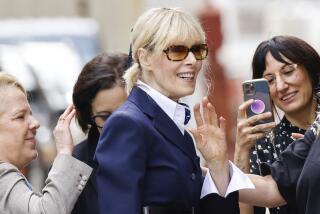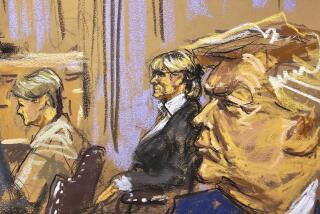For Clinton, a Solid, Poised Performance
- Share via
WASHINGTON — Finally, a witness for the defense.
By most forecasts, President Clinton’s four-hour appearance before independent counsel Kenneth W. Starr’s grand jury had all the makings of a disaster. Shorn of the normal trappings of his office, facing a tag team of hostile prosecutors, the chief executive could have come across as a guilty defendant.
But that isn’t how it turned out.
Instead, the camera captured a controlled and confident Clinton telling his side of the story in detail for the first time. He rebutted much of the legal case against him and launched a counterattack on the four-year, $40-million prosecution as unfair and politically driven.
According to Starr, the president engaged in a sordid sexual relationship coupled with an illegal conspiracy to commit perjury, silence witnesses and obstruct justice. In Clinton’s telling, it was simply a sordid relationship--and nothing more.
The public’s verdict may take several days to coalesce. But at first blush, Clinton’s defenders--and some Republicans--said the president came off better than expected.
“If I were a Republican, I’m not sure I would have put this out,” said GOP pollster Frank Luntz (who is, in fact, a Republican). “It reduces this issue to sex, and that plays in the president’s favor. The more this scandal is about sex, the better for him. The more it is about trust and honesty, the worse for him.”
To be sure, Clinton’s testimony, given before the grand jury under rules of secrecy on Aug. 17 but released by Congress on Monday, was unlikely to persuade Republicans headed toward impeachment hearings to stop short.
Many of the president’s answers seemed evasive--desperate attempts to find loopholes in questions about his sexual relationship with former White House intern Monica S. Lewinsky.
“It depends on what the meaning of the word ‘is’ is,” he said at one point, smiling wryly and arching his left eyebrow, as if relishing the verbal byplay.
But on the legal issues that are likely to prove key to any attempted impeachment, Clinton offered innocent-sounding explanations for what had seemed suspicious attempts to cover up and lie.
Did he try to prevent Lewinsky from testifying in the Paula Corbin Jones sexual harassment case? No, the president said.
“I felt quite comfortable” with Lewinsky filing a sworn statement denying they had had sexual relations because, in Clinton’s view, their occasional “inappropriate” encounters did not amount to a sexual relationship.
“I did not ask her to lie,” he said. And when she needed a job, “I didn’t order her to be hired at the White House.”
Did he use gifts to try to buy silence? No, the gifts “were no big deal,” Clinton said, because he gave and received presents from her and many others.
“I do not believe gifts are incriminating, nor do I believe they are wrong,” he said.
Did he lie under oath in the Jones deposition? No, the president said, although his statements may have been misleading, he conceded.
“I didn’t want this [story] to come out now. I was embarrassed about it,” he said. “My goal in this deposition was to be truthful, but not particularly helpful.”
Starr’s prosecutors hammered at the weakest points in Clinton’s account, but the president held to his particular, narrow definitions to argue that his answers did not add up to perjury.
Difficult Questions, Evasive Answers
Did he truly believe that oral sex is not included under the meaning of “sexual relations?”
“Any person, any reasonable person, would believe that that is not covered in the definition of sexual relations I was given” in the Jones case, he insisted.
Could he really not remember whether he had ever been alone with Lewinsky, as he had testified? “It depends on how you define alone.”
How could his account and Lewinsky’s differ on some key details? Perhaps neither one was wrong, Clinton responded, launching into a digression on the 1991 sexual harassment dispute between Supreme Court nominee Clarence Thomas and Anita Faye Hill. “I thought they both thought they were telling the truth,” he mused.
This was Clinton’s first full-scale defense of his position since the scandal over his relationship with Lewinsky erupted in January--and paradoxically, even though given under duress, it may have been his most effective.
In a dark suit and carefully knotted tie, in the elegant setting of the White House’s Map Room, he addressed the grand jury camera as if he were in televised conversation with the nation. (Indeed, he said he expected the video to become public some day.)
Clinton was briefly contrite for his sexual indiscipline, as he would later be in repeated attempts at a public apology.
But the format of the testimony--the president facing his accusers--allowed him to be as combative as he wanted. So, for the first time, the nation saw Clinton deliver his legal rebuttal at length and with passion.
He seized the opportunity to denounce Starr’s investigation as out of proportion to the crime.
“You have made this the most important issue in America,” he said at one point.
Both the prosecutors and Jones’ lawyers had played a “gotcha game,” he said, trying to catch him in a lie. “I don’t remember all the details. This was not the most important thing in my life.”
He repeatedly showed his anger with the sexual misconduct suit brought by Jones, a former Arkansas employee, that triggered the scandal that engulfed his presidency.
“It was a political lawsuit . . . funded by my political opponents,” Clinton said with gusto.
The aim of Jones’ lawyers, he asserted, was “to cast the widest net we can and get as much embarrassing stuff as we can and then dump it out there and see if we can make [Clinton] bleed.”
It was “outrageous . . . just an effort to hurt me politically,” he said.
He even blamed the prosecutors in part for his inability to remember the details of his conversations with Lewinsky and others.
“My memory is not what it was when I came here,” he said, blaming “the pressure and the pace” of the White House “compounded by the pressure of your four-year inquiry.”
Prosecutors Grow Increasingly Frustrated
After about three hours of questioning, the prosecutors’ frustration was apparent.
Jackie Bennett Jr., Starr’s aggressive deputy, claimed Clinton was “sending some kind of signal” to Lewinsky last month by appearing in public wearing a necktie that Lewinsky testified she had given him.
Looking baffled and amused, the president said he “had no earthly idea” whether the tie had come from Lewinsky.
The public verdict on Clinton’s performance remains unpredictable, GOP pollster Luntz warned.
“There were two Bill Clintons today,” he said, referring to the president’s mixture of persuasion and evasiveness. “The public is going to make up its mind based on the clips it sees over the next 48 hours. . . . We are such a video society. The key is what is on the evening news.
“This may have helped Clinton survive,” he said. “But it’s hard to see how it did much for his place in history.”
More to Read
Get the L.A. Times Politics newsletter
Deeply reported insights into legislation, politics and policy from Sacramento, Washington and beyond. In your inbox twice per week.
You may occasionally receive promotional content from the Los Angeles Times.












